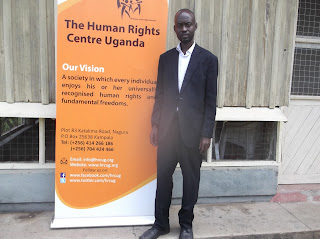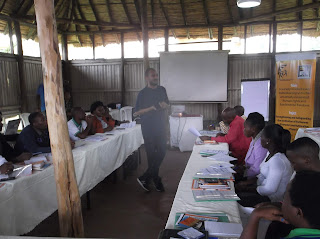Engabu
Za Tooro (Tooro Youth Platform for Action) has been awarded by the Catholic
Diocese of Fort Portal - Uganda for promoting cultural renaissance and revival
inTooro region. Similar to what is happening in many communities in Uganda, Tooro
culture has been declining because of weak institutions especially at clan and
family levels, declining Runyoro – Rutooro language and abandoning the
performance of cultural rituals like the Empaako naming ritual.
 |
| The Bishop of Fort Portal giving out the award |
While
presenting the award on Sunday, 10th June, 2015 to Moses Kigambo Araali,
Engabu Za Tooro cultural musician, the Bishop of the Catholic Diocese of Fort
Portal Rt. Rev. Dr. Robert K. Muhiirwa appreciated Engabu Za Tooro (Tooro Youth
Platform for Action) for revitalizing Tooro culture especially through cultural
music, conducting indigenous knowledge research, safeguarding heritage like the
Koogere and Empaako Intangible Heritage.
The
Bishop of Fort Portal Diocese also appreciated Engabu Za Tooro for
strengthening cultural institutions especially clans and families,
strengthening Tooro language and reviving the performance of cultural rituals
like the Empaako naming ritual among the Batooro, Banyoro, Basongora,
Batagwenda, Banyaruguru, Batuku, Bagungu, Banyabindi, Ba NyaMboga and Baziba in
Western Uganda, Eastern DR Congo and Northern Tanzania respectively.
The
Catholic Diocese of Fort Portal also awarded EngabuZaTooro cultural musician
Moses KigamboAraali for greatly promoting the music industry in Tooro region
through his inspirational and motivational songs like Kihoire Mbogo Ya Mawu, otasomere oliwoha which motivated many
people to appreciate education for development, Akaro Komugisa which was aimed at promoting tourism in the region, Itaka Kintu Kikuru aimed at inspiring
people in the region to appreciate the value of land.
In addition to Kigambo Araali, other Engabu Za Tooro cultural musicians and comedians are Master Kalenzi popularly known for his Obu Nyamahunde and Busongora bwa Kogere songs, Kabagambe Salongo popularly known for his Akaracwa Omuhoro song and Zebidayo Mwesige Mukwikwi who is popularly known for his Akasindikaine comedy.
Listen to Engabu Za Tooro cultural music
The
annual award was also attended by Uganda state minister for Culture Hon. Peace
Mutuuzo, Edward Kawamara - the clan head of Bagweri, the head of the Empaako
safeguarding committee – Msgr. Peter Kumaraki Araali, Rev. Fr. Fredrick Douglas
Waako – the Director of social communications Commission at the Catholic
Church, Richard Rwabuhinga Abboki – the district Chairperson Kabrole, Hon. Alex
Ruhunda Akiiki – MP Fort Portal Municipality and other former political leaders
like the former MPFort Portal Municipality – Henry Basaliza Araali and Former
Fort Portal Mayor – Mr. Bob Kaganda among others.
 |
| EZT Cultural Troupe perfoming |
Engabu
Za Tooro (Tooro Youth Platform for Action) which is accredited to provide
advisory services to UNESCO (ICH Convention) and accredited as an observer of
the Intergovernmental Committee on Intellectual Property and Genetic Resources,
Traditional Knowledge and Folklore by World Intellectual Property Organisation
(WIPO) was founded in 1999 by University leavers led by Stephen Rwagweri Atwoki
who is its current Executive Director and also the head of the Bafumambogo clan
in Tooro region.
The
organization was initially founded as a University student transition movement
with a purpose of orienting university leavers to indigenous culture and
community development work in Uganda.
The
core programmes of the organization are Indigenous knowledge research and
safeguarding heritage, development of youth talents and cultural enterprises,
using culture to sensitise communities on gender, using culture to promote
peace, using culture to promote tourism, using culture to safeguard the
environment, promoting the rights of indigenous peoples and finally using
culture to promote good governance.
 |
| Engabu Za Tooro Certificate |
Currently,
Engabu Za Tooro (Tooro Youth Platform) is implementing a UNESCO co-funded
project aimed at revitalizing ceremonies and practices associated with Empaako
naming system in Uganda among the communities of the Batooro, Banyoro, Batuku,
Batagwenda and Banyabindi of Western Ugandaso as to enhance their capacities to
transmit knowledge and skills to successive generations and to mobilise
practitioners to revive the Empaako naming practice.
Empaako
is naming system whereby in addition to a family and given name, a child is
given a special name called Empaako selected from a fixed and closed list of 12
(twelve) Empaako names shared by the entire society and used as a declaration
of respect, endearment or affection.
This
practice has been shared and transmitted from generation to generation in Empaako
communities of Batooro, Banyoro, Banyabindi, Basongora, Batuku, Batagwenda,
Banyaruguru, Bagungu, Ba Nya Mboga and Baziba located in Western Uganda,
Eastern DR Congo and Northern Tanzania respectively.
 |
| Engabu Za Tooro ED training clan leaders |
However,
the Empaako naming practice is facing threats of extinction mostly due to
decline of its mother language (Runyoro - Rutooro), modernization, abandoning
our traditional rituals, weakening cultural institutions, and attack from
modern religious extremist denominations.











